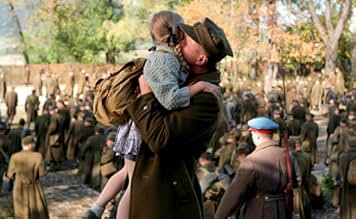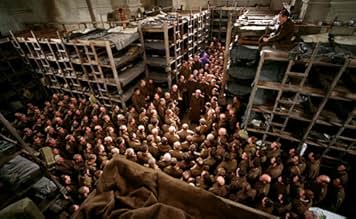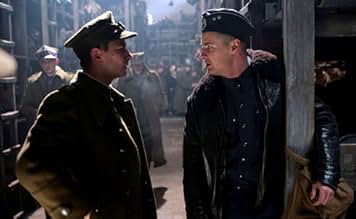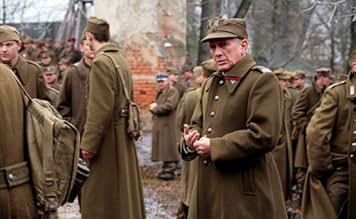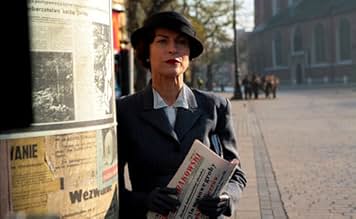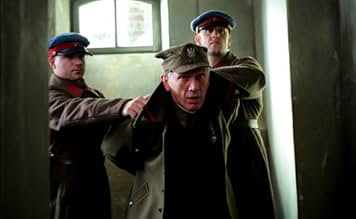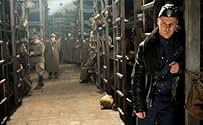An examination of the Soviet slaughter of thousands of Polish officers and citizens in the Katyn forest in 1940.An examination of the Soviet slaughter of thousands of Polish officers and citizens in the Katyn forest in 1940.An examination of the Soviet slaughter of thousands of Polish officers and citizens in the Katyn forest in 1940.
- Nominated for 1 Oscar
- 14 wins & 14 nominations total
Joachim Paul Assböck
- Obersturmbannführer Bruno Müller
- (as Joachim Assböck)
Featured reviews
Everyone in Poland has heard of the Katyn massacre but I've been surprised and saddened at how few people in Britain know of the atrocity. In the early part of the Second World War, more than 4,000 Polish soldiers were executed in the Katyn forest near Smolensk in western Russia. This was part of an organised effort to eradicate the military, political and intellectual leadership of Poland and a series of executions in various other locations removed some 22,000 Poles from their loved ones and their nation.
So, who did this? The Germans claimed to have uncovered the bodies in 1943 and blamed the Soviets in an effort to embarrass and divide the Allies. The Soviet Union categorically denied the crime at the time and for decades afterwards, only in 1990 admitting what the Poles and any independent assessor of the evidence knew: Stalin's NKVD perpetrated the horror on his express command.
The incident has now been made into a major Polish film by the acclaimed Polish director Andrzej Wajda whose own father was killed at Katyn and who is now in his 80s. The work was premiered at the Berlin film festival in 2007; it was nominated for the Academy Award for Best Foreign Film in 2008; and it finally arrived in Britain in a few cinemas in the summer of 2009. It is an exceptional work - both powerful and moving - that deserves a much larger audience.
Starting in 1939 with the simultaneous invasion of Poland by the Nazis and the Soviets, it takes us in several jumps to the immediate post-war period and underlines that the shame of Katyn was not just the deaths of the 22,000 in 1940 but the denial of the truth by so many people for so many years afterwards. Through the device of a prolonged flashback, the film concludes with a return to Katyn with close-up scenes of the sheer brutality of what was unquestionably a war crime.
The film is based on a novel by Andrzej Mularczyk and revolves around a number of fictional families with a fair bit of location work in Krakow, a city centre that looks today much like it did in the 1940s and which I have visited. The photography and acting are both excellent and selective use of wartime film footage simply adds to the sense of verisimilitude.
Footnote: To my utter astonishment, at the Renoir cinema in central London where I saw the film, as I descended the stairs to the screen, I was given a leaflet by a representation of something called The Stalin Society which insisted that the massacre was carried out by the Germans in 1943 and that Wajda's film is simply part of a sustained attempt to discredit communism at a time of economic crisis when so many people would see it as the obvious alternative to capitalism.
So, who did this? The Germans claimed to have uncovered the bodies in 1943 and blamed the Soviets in an effort to embarrass and divide the Allies. The Soviet Union categorically denied the crime at the time and for decades afterwards, only in 1990 admitting what the Poles and any independent assessor of the evidence knew: Stalin's NKVD perpetrated the horror on his express command.
The incident has now been made into a major Polish film by the acclaimed Polish director Andrzej Wajda whose own father was killed at Katyn and who is now in his 80s. The work was premiered at the Berlin film festival in 2007; it was nominated for the Academy Award for Best Foreign Film in 2008; and it finally arrived in Britain in a few cinemas in the summer of 2009. It is an exceptional work - both powerful and moving - that deserves a much larger audience.
Starting in 1939 with the simultaneous invasion of Poland by the Nazis and the Soviets, it takes us in several jumps to the immediate post-war period and underlines that the shame of Katyn was not just the deaths of the 22,000 in 1940 but the denial of the truth by so many people for so many years afterwards. Through the device of a prolonged flashback, the film concludes with a return to Katyn with close-up scenes of the sheer brutality of what was unquestionably a war crime.
The film is based on a novel by Andrzej Mularczyk and revolves around a number of fictional families with a fair bit of location work in Krakow, a city centre that looks today much like it did in the 1940s and which I have visited. The photography and acting are both excellent and selective use of wartime film footage simply adds to the sense of verisimilitude.
Footnote: To my utter astonishment, at the Renoir cinema in central London where I saw the film, as I descended the stairs to the screen, I was given a leaflet by a representation of something called The Stalin Society which insisted that the massacre was carried out by the Germans in 1943 and that Wajda's film is simply part of a sustained attempt to discredit communism at a time of economic crisis when so many people would see it as the obvious alternative to capitalism.
KATYN is one of the most powerful World War II films I have ever seen and from the first frame of Poles fleeing from the Germans to the rear and the Russians in the front, an audience immediately feels the horror and claustrophobia of attempting to flee from the enemy, but with a sense of absolutely no where to run. The cast is simply superb, the story one of Polish Officers who meet their fate at the hands of the enemy, but with a sense of pride in themselves and their families, and the men and women who struggled to deal with both the Germans and the Russians and survive, is one written in the annals of history, but now with the truth of the slaughter finally brought to light. The final scenes in KATYN sent me from the theater with a sense of wanting to get a deep breath of air in my lungs, and to attempt to digest the horror I had just seen on the screen. KATYN deserves the Oscar and it is a film that will haunt you forever.
An estimated minimum of 3 million Poles were killed by the Stalinist regime; but as Stalin observed "When one person dies it's a tragedy; when a million people die it's a statistic".
The scope of these activities would be considered genocide, if that term was used to describe political and social, as well as racial and religious populations.
So - less "statistically"- mothers, fathers, brothers, sisters, kids, and friends were murdered for the political ends of those who now wish to remain faceless and unknown. It is critical, if we are to emerge as a humane people, that the unknown and faceless multitudes of both victims and their oppressors and killers, be reveled. This movie perhaps, is the first step in that direction.
The scope of these activities would be considered genocide, if that term was used to describe political and social, as well as racial and religious populations.
So - less "statistically"- mothers, fathers, brothers, sisters, kids, and friends were murdered for the political ends of those who now wish to remain faceless and unknown. It is critical, if we are to emerge as a humane people, that the unknown and faceless multitudes of both victims and their oppressors and killers, be reveled. This movie perhaps, is the first step in that direction.
Are there words to express suffering, injustice, hypocrisy of war? May empathy ease the pain of those who lost hope for a better world?
There are many movies on WWII that appear to be more or less captivating, touching as well as educational. And, in this respect, we could easily rate this movie in that way if we treat KATYN as yet another film on WWII. However, the case here is different, more to say exceptionally unique.
Andrzej Wajda, after 18 years since the downfall of communist regime, fulfills the duty he feels to his parents and all Polish Patriots and makes a film on the theme that, not long ago, was not only forbidden to discuss in theater or cinema, but in all public places, the Truth that was prohibited and highly unwelcome, the Truth about the slaughter of more than 20,000 Polish best officers committed by Soviet communists in the forests of Katyn. Andrzej Wajda based his film on Andrzej Mularczyk's story POST MORTEM and consulted great Katyn witnesses, including recently deceased Priest Zdzislaw Peszkowski (1918-2007). If the film is good or weak belongs to the opinions of particular viewers. But lots of people on the premiere day stated that it's a historic work. Why?
KATYN, though a movie, is a wonderful documentary that supplies the viewer with TRUTHFUL information on what really happened in 1940, why it happened and who did this (facts that were most distorted in many historical books and many other sources for years). Here, the truth is more important than anything else. The movie contains archive footage, pictures and terrific narrator. These moments are well balanced and, though appearing several times, do not disturb anything but make for all the rest. And what is the rest?
The rest contains particularly vivid plots of families, their dreams, their fear, husbands/sons' honor, wives' love and care, and foremost young officers' martyrdom. The story of Andrzej (Artur Zmijewski) is exceptionally moving. His situation seems to represent the Poland of that time: torn between two oppressors, two worlds: Nazi Germany who attacked it on September, the 1st, 1939 and communist Russia who attacked it from the east 17 days later. As a victim of Katyn massacre, Andrzej appears to tell us a tragic story of separation, extreme suffering, but hope, to the very last day, the hope for survival. His notebook seems to tell us: "No, I will live, they're taking us somewhere but I'll surely see my beloved woman, my loving mum and my sweet daughter." The tragic though full of hope Christmas Eve also depicts that attitude. Other characters, including Jerzy (Andrzej Chyra), Andrzej's wife Anna (Maja Ostaszewska), General's wife (Danuta Stenka) constitute a brilliant insight into various, usually helpless, reactions towards evil, hypocrisy, injustice, cruelty and neutrality.
These stories are executed in an accurate and universal way. In such historic but tragic content, there is usually a tendency to become either too preachy or too emotional, which, to some extend, jerk the tears from viewers' eyes by force. Wajda does not do anything of these. He remains with the people, with humanity in general, does not give the final answer to anything. He seems to be with all of us and appears to depict a quest for truth, quest for justice and for humanity. Besides, he uses lots of very accurate symbols. The unforgettable and probably most thought provoking symbol is when Andrzej's wife looks for her husband and uncovers the bodies of soldiers. Among them, she occurs to uncover the figure of Christ taken from the Cross in church and laid among the deceased. Haven't we killed God by losing respect for life? Another brilliant symbol is when Russian soldiers tear the Polish flag into two parts, hanging the red part again as the Russian flag and using the white part as a foot dressing.
Except for the factors described above, KATYN is also a wonderful piece of work as a film. Very good cinematography, moody atmosphere, flawless performances. Artur Zmijewski does a brilliant job as Andrzej, Maja Ostaszewska is genuine as his wife and heroic, in a sense, Maja Komorowska is again a real artist in her job giving a real portrayal of the caring and then mourning mother. And Andrzej Chyra as Jerzy whose conscience and solidarity do not allow him to go on...magnificent!
But at the end I must tell you that it was not easy for me to write this review. The stories like this one do not lead to wordy comments, much noise, opinions, praise or criticism. They call for silence, the sacred silence that lets us honor those who died in such inhumane way. This silence shall constitute a significant message for today's generation, shall help us see deeper and give us faith to believe that their lives did not end in the soil. Therefore, though difficult, I consider KATYN one of the most important movies I have seen in my life.
Yes, dear young Patriot, hold Your Rosary high. The world will probably call your act "the act of despair". Yet, the world is befriended with lie and you are now victorious in a world of Glory and Eternal Light where there is no room for "lie". R.I.P.
There are many movies on WWII that appear to be more or less captivating, touching as well as educational. And, in this respect, we could easily rate this movie in that way if we treat KATYN as yet another film on WWII. However, the case here is different, more to say exceptionally unique.
Andrzej Wajda, after 18 years since the downfall of communist regime, fulfills the duty he feels to his parents and all Polish Patriots and makes a film on the theme that, not long ago, was not only forbidden to discuss in theater or cinema, but in all public places, the Truth that was prohibited and highly unwelcome, the Truth about the slaughter of more than 20,000 Polish best officers committed by Soviet communists in the forests of Katyn. Andrzej Wajda based his film on Andrzej Mularczyk's story POST MORTEM and consulted great Katyn witnesses, including recently deceased Priest Zdzislaw Peszkowski (1918-2007). If the film is good or weak belongs to the opinions of particular viewers. But lots of people on the premiere day stated that it's a historic work. Why?
KATYN, though a movie, is a wonderful documentary that supplies the viewer with TRUTHFUL information on what really happened in 1940, why it happened and who did this (facts that were most distorted in many historical books and many other sources for years). Here, the truth is more important than anything else. The movie contains archive footage, pictures and terrific narrator. These moments are well balanced and, though appearing several times, do not disturb anything but make for all the rest. And what is the rest?
The rest contains particularly vivid plots of families, their dreams, their fear, husbands/sons' honor, wives' love and care, and foremost young officers' martyrdom. The story of Andrzej (Artur Zmijewski) is exceptionally moving. His situation seems to represent the Poland of that time: torn between two oppressors, two worlds: Nazi Germany who attacked it on September, the 1st, 1939 and communist Russia who attacked it from the east 17 days later. As a victim of Katyn massacre, Andrzej appears to tell us a tragic story of separation, extreme suffering, but hope, to the very last day, the hope for survival. His notebook seems to tell us: "No, I will live, they're taking us somewhere but I'll surely see my beloved woman, my loving mum and my sweet daughter." The tragic though full of hope Christmas Eve also depicts that attitude. Other characters, including Jerzy (Andrzej Chyra), Andrzej's wife Anna (Maja Ostaszewska), General's wife (Danuta Stenka) constitute a brilliant insight into various, usually helpless, reactions towards evil, hypocrisy, injustice, cruelty and neutrality.
These stories are executed in an accurate and universal way. In such historic but tragic content, there is usually a tendency to become either too preachy or too emotional, which, to some extend, jerk the tears from viewers' eyes by force. Wajda does not do anything of these. He remains with the people, with humanity in general, does not give the final answer to anything. He seems to be with all of us and appears to depict a quest for truth, quest for justice and for humanity. Besides, he uses lots of very accurate symbols. The unforgettable and probably most thought provoking symbol is when Andrzej's wife looks for her husband and uncovers the bodies of soldiers. Among them, she occurs to uncover the figure of Christ taken from the Cross in church and laid among the deceased. Haven't we killed God by losing respect for life? Another brilliant symbol is when Russian soldiers tear the Polish flag into two parts, hanging the red part again as the Russian flag and using the white part as a foot dressing.
Except for the factors described above, KATYN is also a wonderful piece of work as a film. Very good cinematography, moody atmosphere, flawless performances. Artur Zmijewski does a brilliant job as Andrzej, Maja Ostaszewska is genuine as his wife and heroic, in a sense, Maja Komorowska is again a real artist in her job giving a real portrayal of the caring and then mourning mother. And Andrzej Chyra as Jerzy whose conscience and solidarity do not allow him to go on...magnificent!
But at the end I must tell you that it was not easy for me to write this review. The stories like this one do not lead to wordy comments, much noise, opinions, praise or criticism. They call for silence, the sacred silence that lets us honor those who died in such inhumane way. This silence shall constitute a significant message for today's generation, shall help us see deeper and give us faith to believe that their lives did not end in the soil. Therefore, though difficult, I consider KATYN one of the most important movies I have seen in my life.
Yes, dear young Patriot, hold Your Rosary high. The world will probably call your act "the act of despair". Yet, the world is befriended with lie and you are now victorious in a world of Glory and Eternal Light where there is no room for "lie". R.I.P.
I watched "Katyn" on a home computer screen. Even in that limited format, "Katyn" had an impact on me comparable to such cinematic greats as "Lawrence of Arabia." I cried throughout most of the film. I resolved that many of my relationships would be different. I remembered people I had known who reminded me of characters in the movie. After the film ended, I felt that I could not listen to the radio or read the newspaper or listen to anyone speak. I just needed to allow the film to sink into me.
Naysayers have critiqued "Katyn" as boring and dull. If you need a film to depict war, occupation, and atrocity as shiny, compact, and compelling as a sports car, then you should listen to those naysayers; don't watch "Katyn," rather, watch the very silly, teen fanboy-friendly Quentin Tarantino flic, "Inglorious Bastards." If you've seen enough Hollywood productions jam-packed with sexy Nazis and happy endings, and you want to take in a film that dares to depict, in eyeblinks, what war, atrocity, and occupation looked like and felt like to real people, then by all means see "Katyn." One of the many features that I admired: "Katyn"'s Nazis are not sexy. They are not Tom Cruise, Liam Neeson, Christoph Waltz. "Katyn"'s Nazis are brutal, repugnant thugs.
I respect this movie. There are too few movies about which I'd say that. It shows the courage not to attempt to weave an uplifting, feel-good atrocity narrative that leaves the viewer with a smile. This isn't "Schindler's List." "Schindler's List" is a very good movie, but this isn't that. It is, rather, very much like what World War Two and the subsequent Soviet occupation sounded like to me when I listened to my own older friends and relatives, who lived through both. This is disjointed narrative, stories that seem headed for redemption or even ecstasy but that end in random death, that end in aborted normalcy, aborted joy, aborted meaning. I felt, in watching these cold, pale, stoic characters, as if I were, once again, sitting across the table from older Eastern European friends and relatives. Yes, that's what they looked like. Yes, those are the facial expressions they assumed when they talked about the uncle who was rounded up and never heard from again, the daring, handsome lad who ended up in a mass grave – or when they pointedly did *not* talk about these people. The gravestone whose inscription dares to tell the truth; the tearing down of a propaganda poster; the Red Army soldier who struggles to do the right thing by a widow, who won't yet admit that she is a widow; the singing of exactly the right Christmas carol at exactly the right moment: those are exactly the heroic gestures that no one ever saw, that went unrecorded, that only one person lived to tell about, to tell me. Here they are, on screen.
When a movie is named "Katyn" the viewer knows how it will end; it's kind of like a movie named "Auschwitz" or "Kolyma" or "Wounded Knee." There isn't going to be a surprise ending. I was still surprised by the ending, by how courageous and moving I found it. Once again, Andrzej Wajda managed to wow the film-goer in me. And he managed to move the human in me.
See "Katyn." See a movie you can respect, a movie that is worth your time.
Naysayers have critiqued "Katyn" as boring and dull. If you need a film to depict war, occupation, and atrocity as shiny, compact, and compelling as a sports car, then you should listen to those naysayers; don't watch "Katyn," rather, watch the very silly, teen fanboy-friendly Quentin Tarantino flic, "Inglorious Bastards." If you've seen enough Hollywood productions jam-packed with sexy Nazis and happy endings, and you want to take in a film that dares to depict, in eyeblinks, what war, atrocity, and occupation looked like and felt like to real people, then by all means see "Katyn." One of the many features that I admired: "Katyn"'s Nazis are not sexy. They are not Tom Cruise, Liam Neeson, Christoph Waltz. "Katyn"'s Nazis are brutal, repugnant thugs.
I respect this movie. There are too few movies about which I'd say that. It shows the courage not to attempt to weave an uplifting, feel-good atrocity narrative that leaves the viewer with a smile. This isn't "Schindler's List." "Schindler's List" is a very good movie, but this isn't that. It is, rather, very much like what World War Two and the subsequent Soviet occupation sounded like to me when I listened to my own older friends and relatives, who lived through both. This is disjointed narrative, stories that seem headed for redemption or even ecstasy but that end in random death, that end in aborted normalcy, aborted joy, aborted meaning. I felt, in watching these cold, pale, stoic characters, as if I were, once again, sitting across the table from older Eastern European friends and relatives. Yes, that's what they looked like. Yes, those are the facial expressions they assumed when they talked about the uncle who was rounded up and never heard from again, the daring, handsome lad who ended up in a mass grave – or when they pointedly did *not* talk about these people. The gravestone whose inscription dares to tell the truth; the tearing down of a propaganda poster; the Red Army soldier who struggles to do the right thing by a widow, who won't yet admit that she is a widow; the singing of exactly the right Christmas carol at exactly the right moment: those are exactly the heroic gestures that no one ever saw, that went unrecorded, that only one person lived to tell about, to tell me. Here they are, on screen.
When a movie is named "Katyn" the viewer knows how it will end; it's kind of like a movie named "Auschwitz" or "Kolyma" or "Wounded Knee." There isn't going to be a surprise ending. I was still surprised by the ending, by how courageous and moving I found it. Once again, Andrzej Wajda managed to wow the film-goer in me. And he managed to move the human in me.
See "Katyn." See a movie you can respect, a movie that is worth your time.
Did you know
- TriviaThe director's father was killed in this massacre. Andrzej Wajda was only 13 years old then. His father's remains were never found.
- GoofsTur says to Ewa, "Haven't you seen that Disney's "The Sleeping Beauty", remember?" That movie was first released fourteen years after 1945, so this may be a mistranslation in the subtitles for "Snow White".
- ConnectionsFeatured in The 80th Annual Academy Awards (2008)
- SoundtracksPolish Requiem For 4 Solo Voices, Choir And Orchestra
Written by Krzysztof Penderecki
Performed by Polish State Philharmonic Orchestra
- How long is Katyn?Powered by Alexa
Details
- Release date
- Country of origin
- Official site
- Languages
- Also known as
- Катинь
- Filming locations
- Production companies
- See more company credits at IMDbPro
Box office
- Budget
- €4,000,000 (estimated)
- Gross US & Canada
- $118,095
- Opening weekend US & Canada
- $11,053
- Feb 22, 2009
- Gross worldwide
- $14,768,451
- Runtime
- 2h 2m(122 min)
- Color
- Sound mix
- Aspect ratio
- 2.35 : 1
Contribute to this page
Suggest an edit or add missing content

